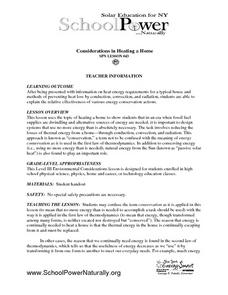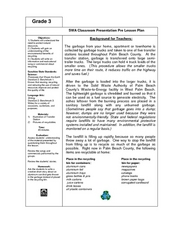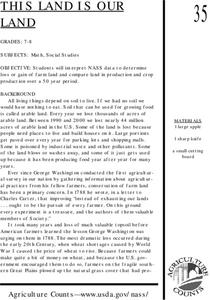Polar Trec
What Is My Footprint?
How do one's habits and lifestyle choices affect the environment? Through a short online survey, learners will calculate their own carbon footprints then determine how to reduce their impact on the environment through simple steps, such...
Curated OER
Energy Transfer (Heat)
The pages of this resource are in landscape view and ready-made to use as slides in a presentation on energy transfer in your high school physical science course. Begin with pertinent vocabulary and finish with an explanation of the...
Curated OER
Whose Water is It Anyway?
Students role play various stakeholders who need water and make a pitch for the water allocation of a pond that is gradually decreasing in depth due to the overuse of water.
Curated OER
Independence and Conservation
Students read an original story "Brothers of the Rainforest" downloaded from the internet site provided. Students investigate the impact of the demise of a particular species on the rest of the environment. Students participate in a...
Curated OER
Knowing the Essential Elements of a Habitat
First graders compare their environment with that of Belize by researching via the internet on the sites provided. Students participate in various activities/centers utilizing the information they discovered.
Curated OER
German Energy Conversations
High schoolers identify and interpret the current German energy mix and trends, as well as to make comparisons and contrasts to that of their own country. They write a two paragraph description of including its likely position in the...
Curated OER
Be Water Wise!
Rally your administration and facilities manager to let your class examine the water flow rates in different areas of the school. After the audit, the class researches opportunites for conserving water and writes a report or develops a...
Curated OER
Conserving Water through Art!
Students study water conservation. In this water conservation lesson, students investigate the scarcity of water and determine reasons for conserving water. Students estimate how much water they use in one day and identify ways to...
Curated OER
Drip and Drop's Adventure
Young scholars determine ways of conserving water and write a Big Book about them. In this water conservation lesson plan, students participate in a puppet show about Drip and Drop, and ways to conserve water. They write a book that...
Curated OER
Considerations in Heating a Home
Emerging engineers discover how important it is to conserve energy as fossil fuel supplies are being diminished. This is accomplished by working through a handout that explains energy requirements for heating a home during the winter....
Curated OER
Don't Let the Earth Down
Writing a persuasive argument starts with a clear thesis. Using this resource, your class will write a persuasive paper on a conservation issue. They will then transform their argument into a 30-second public service announcement. If...
Curated OER
Restoring and Protecting Chesapeake Bay and River Water Quality
A professional and comprehensive presentation on Chesapeake Bay water quality is in store for your ecology class. If you live in the Chesapeake Bay region and want to get learners involved in conservation efforts, this slide show will do...
Curated OER
Persuasive Arguments
Examine persuasive writing using this informational excerpt about natural habitat conservation. Readers examine the headings of three paragraphs to determine their effect, then copy the first sentences of each. They use these topic...
Curated OER
WATER HERE AND THERE
Introduce the topic of water conservation with a little drama. Dressed as snowflakes, hail stones, or rain drops class members dramatize the events in a narration of the water cycle. The series of lessons that follow focus on...
Curated OER
New Words: Make a Conservation Dictionary
Gosh dictionaries are great, and your class gets to make one of their own. They look up and write down the dictionary definition to nine words related to conservation and pollution prevention. They list their words alphabetically for...
Curated OER
Don't Let the Earth Down
Although recycling is definitely beneficial, reducing our waste and conserving our natural resources should really be the focus of environmentalists. Encourage the future generation to create a public service announcement about a...
Curated OER
Importance and History of Ecological Conservation
Discuss and analyze a variety of information regarding the history of ecological conservation and preservation, as well as its importance. Scholars work in groups to complete four different activities, then report back to the class for a...
Curated OER
Protecting Natural Resources
Third graders recognize what our natural resources are and their importance. In this natural resource recycling instructional activity, 3rd graders understand why it is important to recycle and conserve natural resources. Students can...
Curated OER
Cartoons in the Classroom: Conserve or Drill
To drill or to conserve? This question is the foundation of the political cartoons up for critical analysis in this well-composed worksheet. Learners will analyze two cartoons guided by background information and excellent questions for...
Curated OER
Saving Sturgeon
Marine biology apprentices interpret data of sturgeon interaction with gill nets. They use the data to calculate the percentage of fish entangled in each twine size to discover if there is any correlation. This is a valuable exercise in...
Curated OER
Rapa River Watch
Assess the risk of introducing a non-native species of snail to four different estuaries. Lab groups conduct research as habitat evaluation and present their conclusions to the class. The resource has a comprehensive booklet containing...
Curated OER
Chilean Sea Bass
Introduce your mini-marine biologists to using databases. Tables of how many Chilean Sea Bass were caught and number of hours spent fishing are examined. Using the data, individuals calculate the "Catch per Unit of Effort" for each year....
Curated OER
Energy Efficiency Ambassadors
Students research energy conservation devices. They also create their own light efficiency project and presents their findings on science fair night.
Curated OER
This Land is Our Land
Young scholars interpret NASS data to determine loss or gain of farm land and compare land in production and crop production over a 50 year period.

























